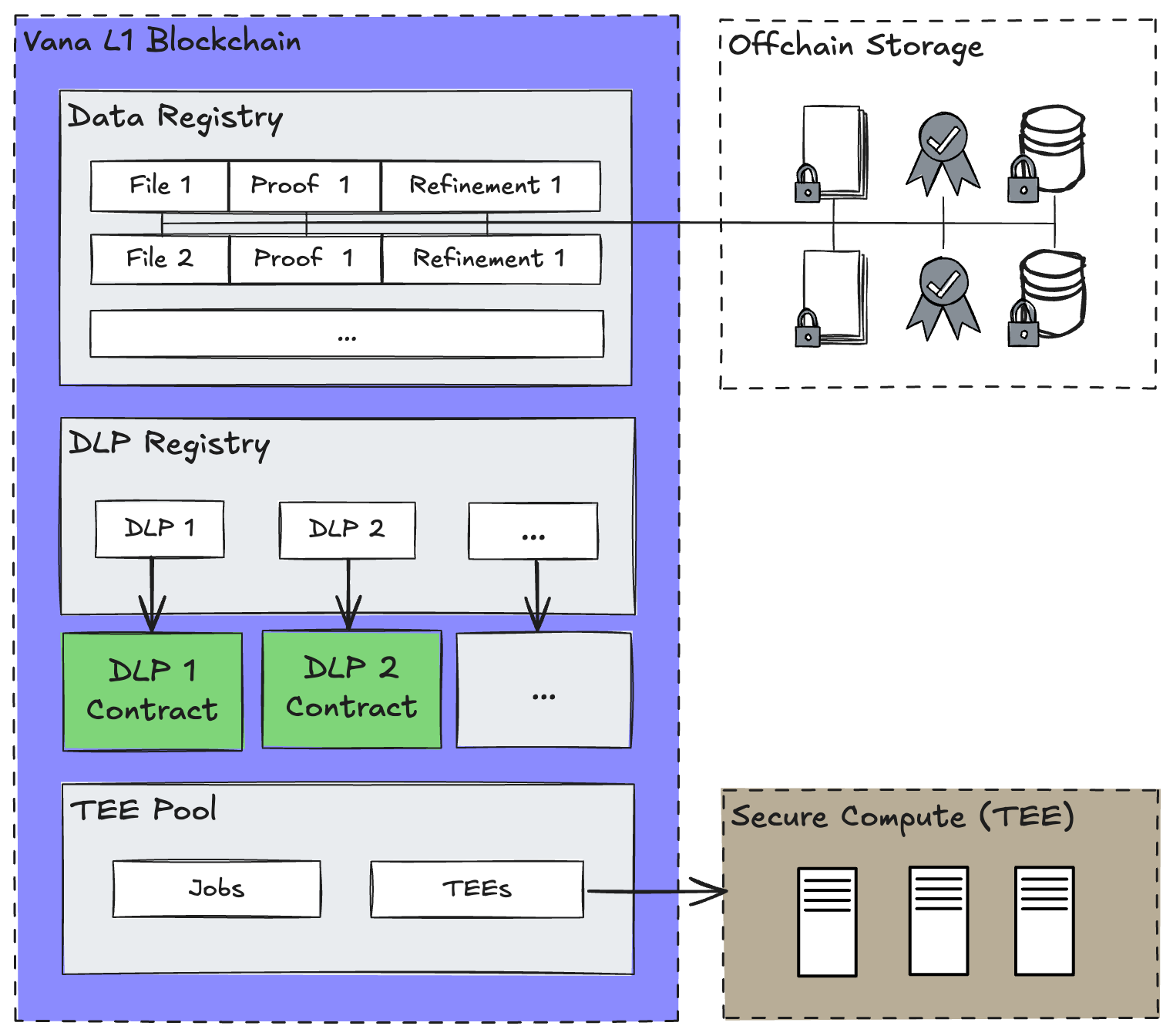Smart Contracts
The Vana network relies on several key smart contracts to facilitate data liquidity.
Smart contracts form the backbone of Vana's decentralized data economy by handling data registration, tokenization, rewards, and governance in a secure and transparent manner.

- Data Registry: The data registry is the main entry point for data in the Vana network.
- TEE Pool: The TEE Pool orchestrates TEEs in the Satya Network.
- DLPRewards: Smart contracts that implement the VRC-14 liquidity-based reward distribution system for Data Liquidity Pools, replacing direct VANA emissions with market-driven incentives that create deeper liquidity for data assets.
- VanaEpoch: Manages the Vana epoch system using quarterly cycles, coordinating the timing of DLP performance evaluation and reward distribution across the ecosystem. DLPRegistry: Manages the central registry of all DLPs in the Vana ecosystem, tracking their registration status, VRC compliance verification, and eligibility for reward participation.
- DLPPerformance: An oracle that stores off-chain calculated DLP performance scores and automatically distributes epoch rewards based on final scores submitted after each epoch ends
- DLPRewardDeployer: Implements VRC-14's liquidity-based DLP incentives by converting VANA rewards into 90 daily tranches that purchase DLP tokens and add liquidity to DEX pools, triggered at random times by an off-chain oracle to prevent market manipulation.
- DLPRewardSwap: A helper for the DLPRewardDeployer that manages the complex swap and liquidity operations needed to convert VANA rewards into optimized DLP token liquidity positions.
- SwapHelper: A helper that manages the integration between Vana smart contracts and Uniswap protocols, handling swaps, quotes, and liquidity operations while abstracting away Uniswap's technical complexities.
- DataAccess: Core infrastructure for secure data storage, refinement, querying, and computation within the Vana network, enabling decentralized data processing through TEE-based execution environments.
- DataRefinerRegistrydata: Registry for data refiners that define schemas and transformation instructions for processing raw data into structured formats.
- ComputeEngine: Orchestrates compute job execution across TEE pools with automatic assignment, payment management, and job lifecycle tracking.
- ComputeEngineTeePool: Manages a pool of TEE nodes configured for specific timeout durations and hardware types (CPU/GPU).
- ComputeEngineTeePoolFactory: Factory contract for creating and managing different types of TEE pools based on job requirements.
- ComputeInstructionRegistry: Registry for approved compute instructions with DLP-based approval system ensuring data security.
- QueryEngine: Manages data access permissions and payments for querying refined data with revenue sharing between data owners and DLPs.
- DataAccessTreasury: Treasury contracts for managing and distributing payments for data access and compute job execution.
- DataPortability: The data portability contracts enable users to securely grant authorized grantees access to their data files through trusted servers with cryptographic signature verification and permission management.
- DataPortabilityPermissions: Manages user permissions that grant specific grantees access to selected data files with signature-based authorization.
- DataPortabilityGrantees: Maintains a registry of authorized entities that can receive data access permissions from users.
- DataPortabilityServers: Manages the registry of data portability servers and user trust relationships for secure data transfers.
- VanaPool: VanaPool is a decentralized staking protocol that allows users to stake VANA tokens into different entities, earning continuously compounded rewards based on each entity's APY while maintaining their share ownership through a dynamic shares system.
- VanaPoolEntity: Manages yield-generating entities with configurable APY settings and reward distribution mechanisms.
- VanaPoolStaking: Enables users to stake and unstake VANA tokens across different entities using a share-based accounting system.
- VanaPoolTreasuty: A secure vault contract that holds staked VANA tokens and manages their distribution when users unstake.
- Data Liquidity Pool & DLP Token: A DataDAO's implementation of how to tokenize data in the Vana network.
- Multicall3: Enables batching multiple smart contract calls into a single transaction to optimize gas usage and execution efficiency.
- Multisend: Allows batch transfers of tokens or ETH to multiple addresses in a single transaction, reducing gas costs for bulk operations.
- DLPRoot - deprecated - these contracts have been migrated to VanaPool and DlpRewards contracts
- DLPRootEpoch - deprecated: Handles epoch-based operations including creation, finalization, and reward distribution for DLPs across time periods.
- DLPRootCore - deprecated: Manages the DLP lifecycle including registration, verification, and stake management with eligibility thresholds.
- DLPRootStaking - deprecated: Manages staking functionality including stake creation, withdrawal, migration, and reward.
- DLPRootMetrics - deprecated: Calculates performance ratings and rewards for DLPs, determining top performers based on stake amounts and custom metrics.
- DlpRootTreasuries - deprecated: Manages staked and reward VANA tokens through separate treasuries for staking and reward distribution.
Available on Github
Updated 3 months ago
